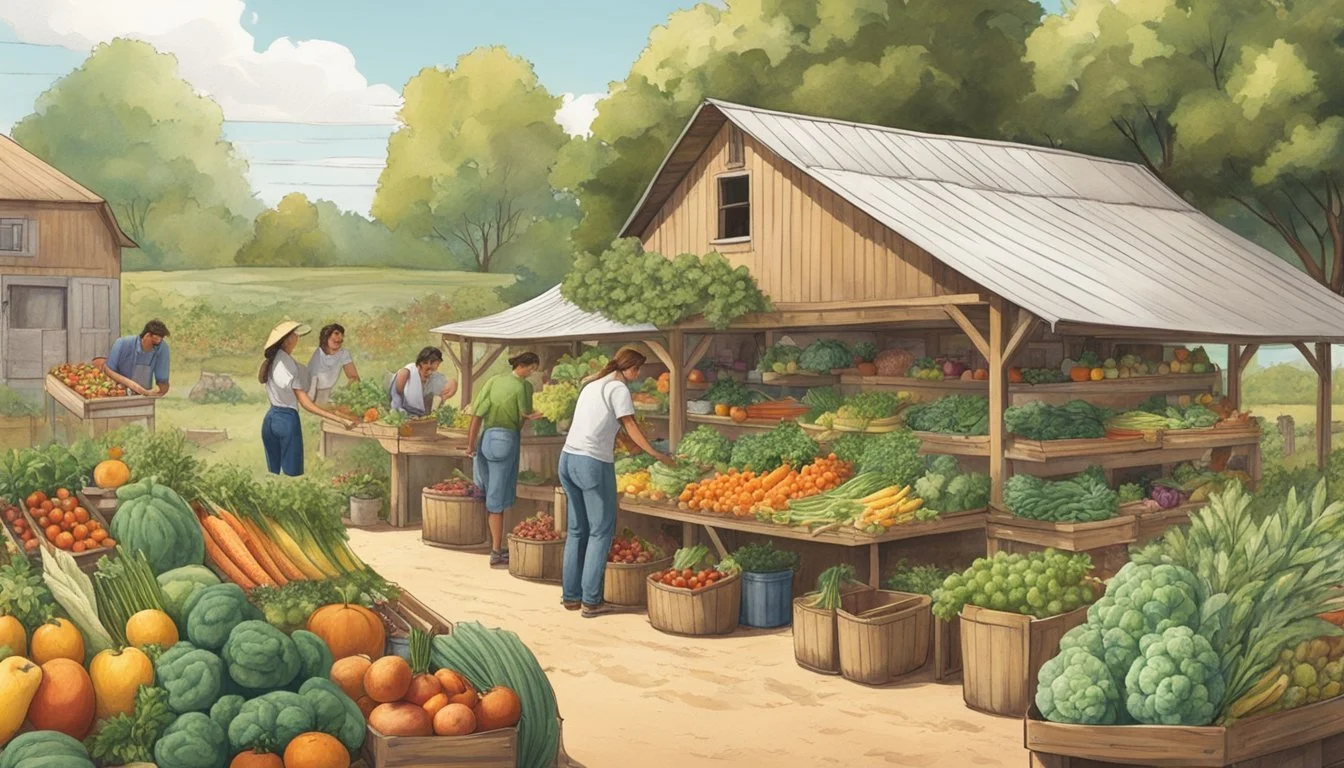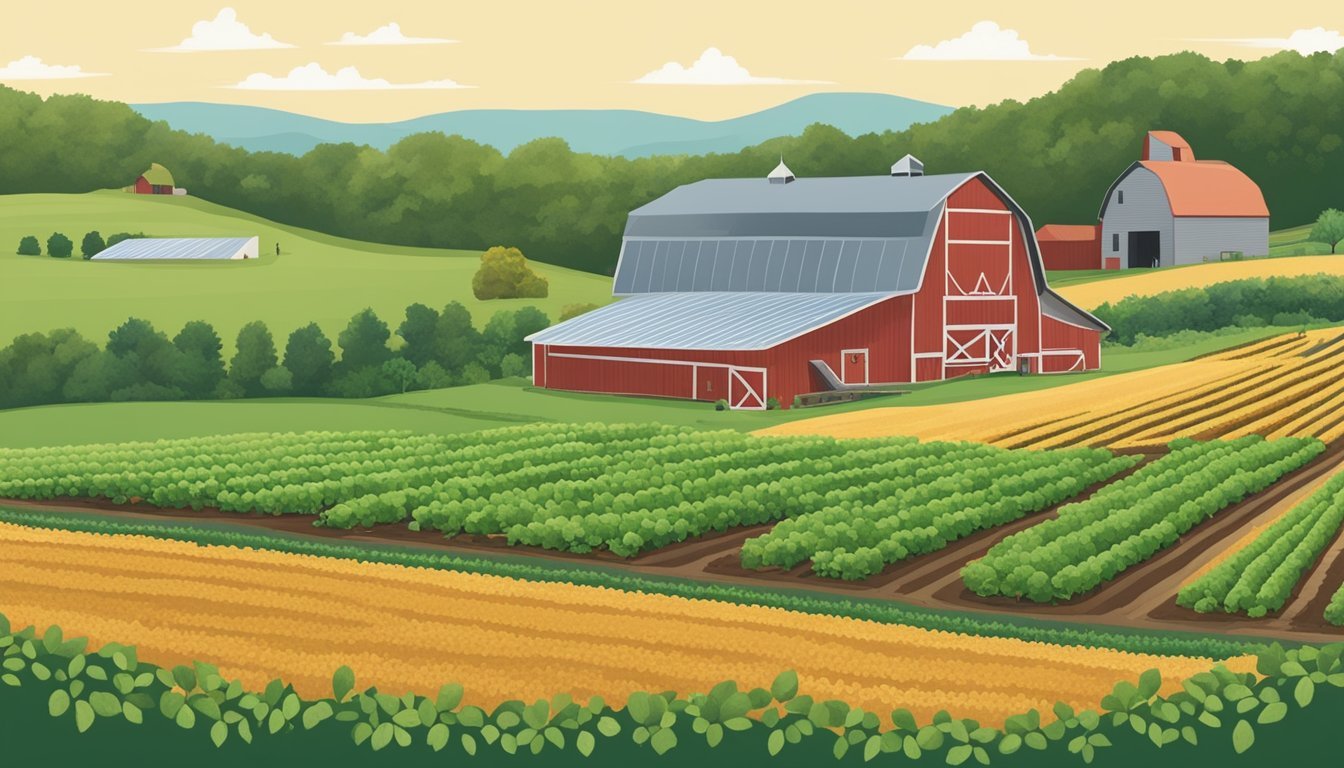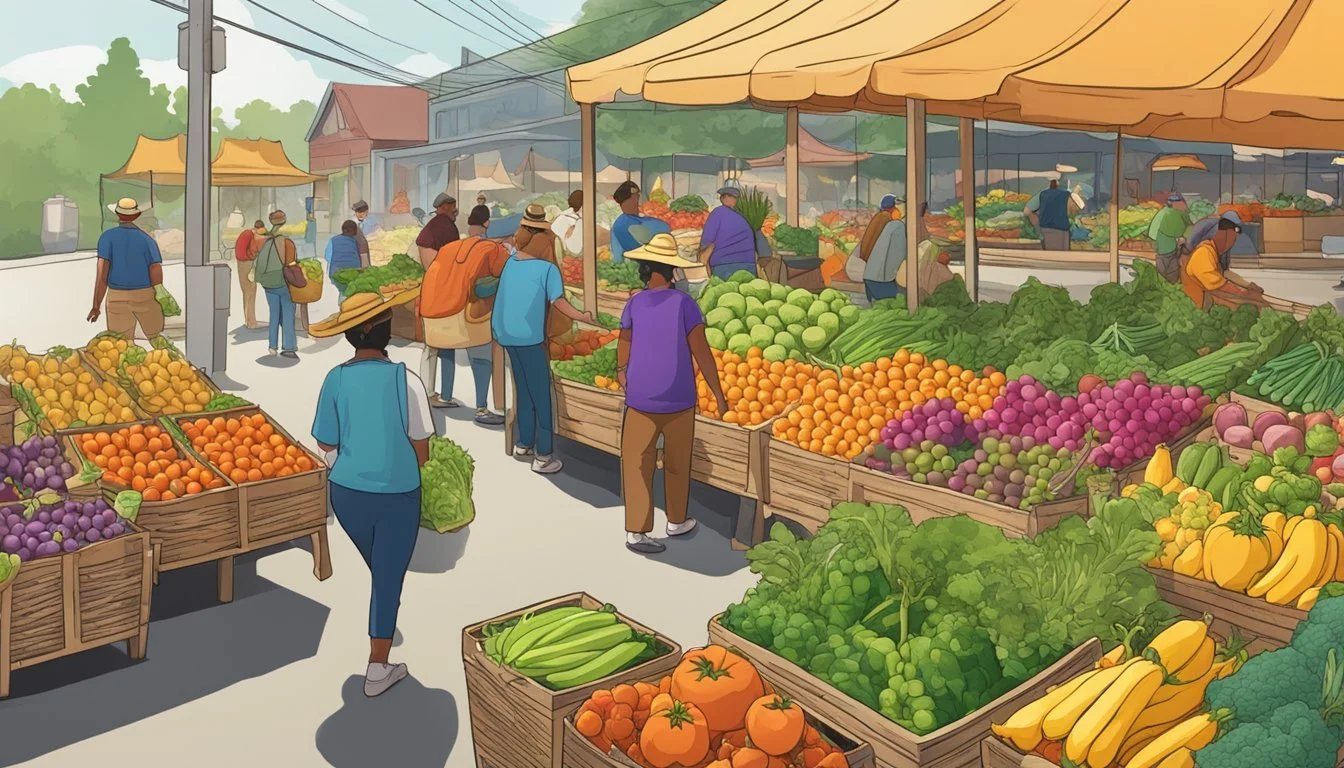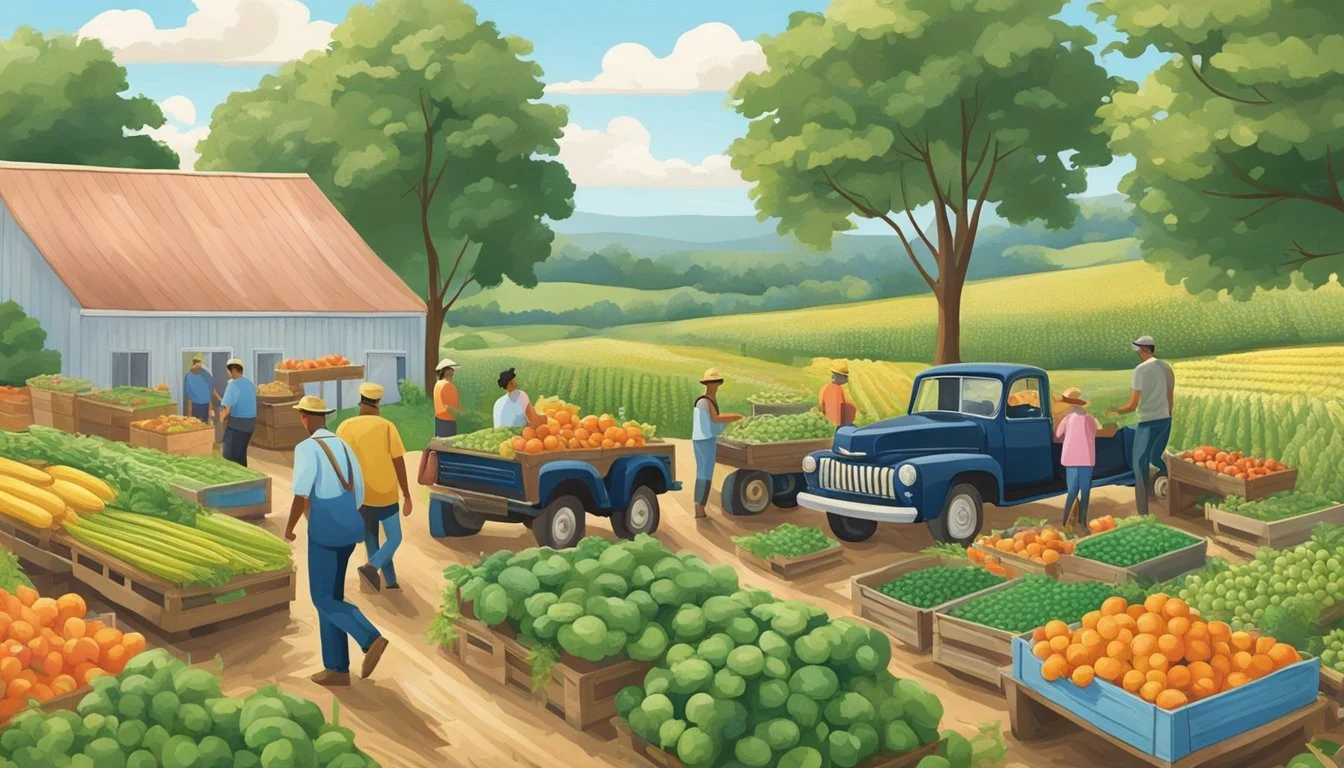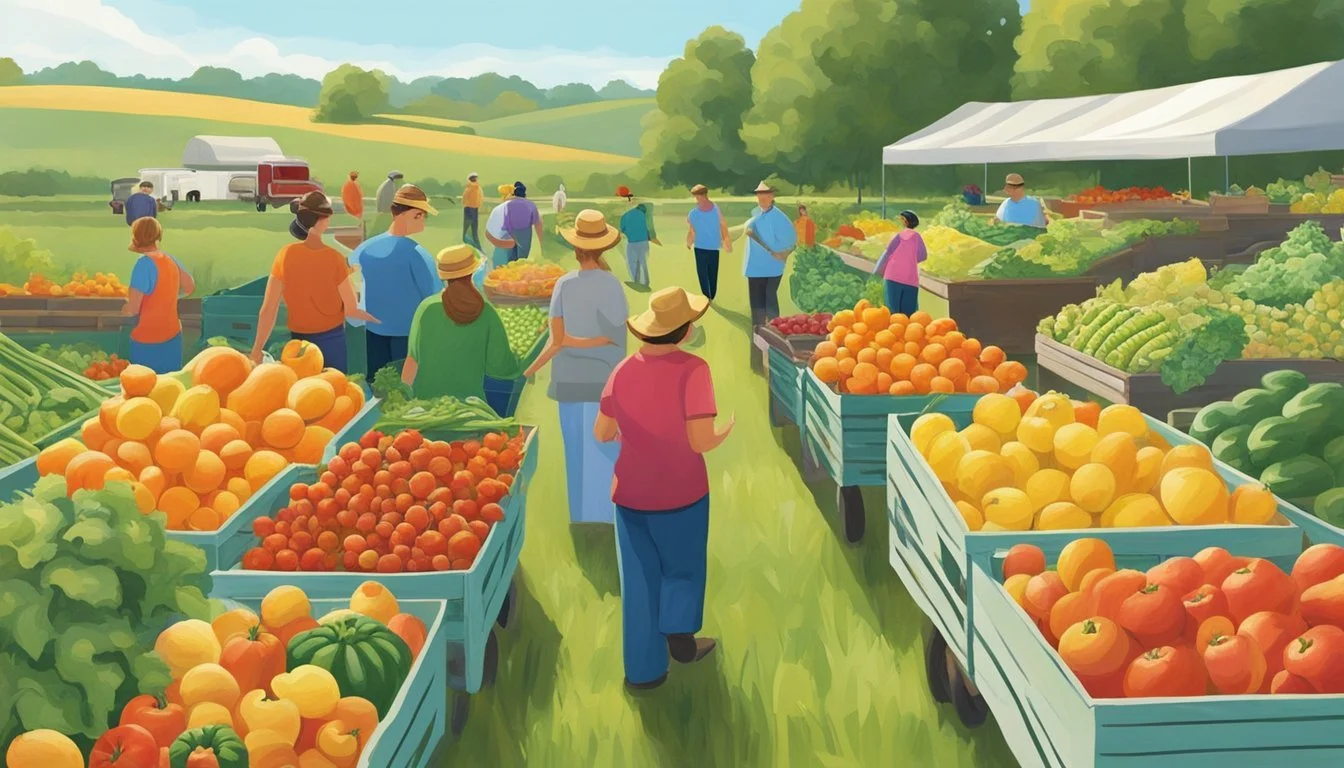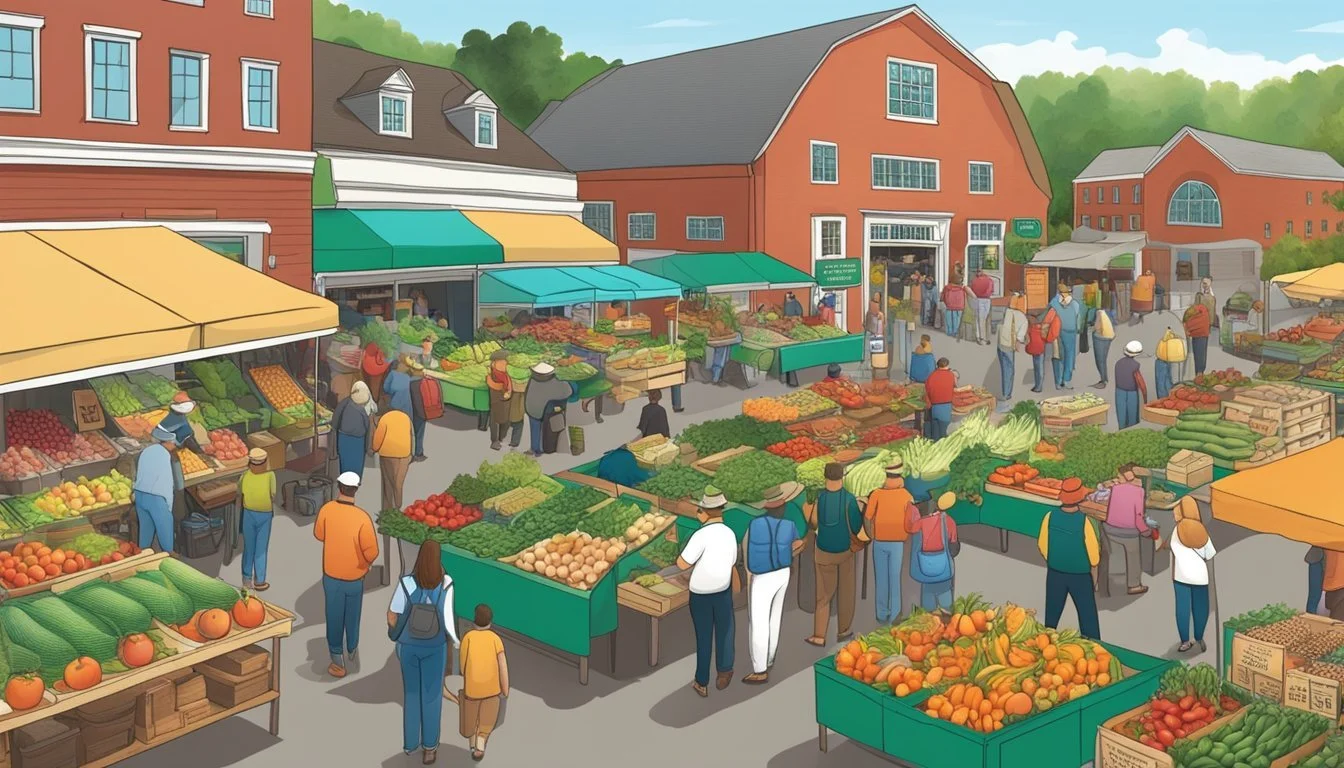Community Supported Agriculture in Pennsylvania
Benefits and Growth
Community Supported Agriculture, commonly known as CSA, is an innovative model for connecting consumers and farmers directly in Pennsylvania and beyond. Through this system, consumers subscribe to the harvest of a particular farm or group of farms, often paying for a season's worth of produce upfront. This upfront investment provides farmers with the capital they need at the start of the growing season and assures them a market for their produce. In return, consumers receive regular shares of farm-fresh produce, typically on a weekly basis throughout the farming season.
In Pennsylvania, CSA programs reflect the state's rich agricultural heritage and its community's commitment to supporting local food systems. The concept of CSA began on the East Coast of the United States and has since seen significant growth in popularity, especially in the wake of food supply concerns and a greater desire for locally sourced products. Many CSAs in Pennsylvania offer not just vegetables but may include other farm products like fruits, eggs, dairy, and meats, providing a more comprehensive approach to local eating.
The resurgence of CSA programs in Pennsylvania speaks to a larger trend toward sustainable eating practices and a closer connection between consumers and their food sources. With the rise of these programs, Pennsylvanians have more options for accessing high-quality, organic produce grown within their local community. The positive impact of CSA is multifaceted: supporting the local economy, reducing the carbon footprint associated with long-distance food transportation, and ultimately encouraging healthier, community-oriented lifestyles.
Understanding CSA
Community Supported Agriculture represents a partnership between local farmers and the community. It offers consumers fresh, locally-produced food and provides farmers a steady market.
Definition of CSA
Community Supported Agriculture (CSA) is a model where consumers purchase shares of a farm's harvest in advance. This financial commitment provides the farm with capital to cover the production costs. In return, shareholders receive periodic allotments of the farm's produce, which often includes vegetables, fruits, herbs, and occasionally additional products such as eggs or honey.
History in Pennsylvania
Pennsylvania has a rich history of agricultural practices and CSA has been part of this tapestry for several decades. The CSA model has contributed to the sustainability of small farms in Pennsylvania, enabling them to continue producing diverse crops and to maintain healthy, fertile land. The concept has gained more attention as consumers increasingly seek to understand the origins of their food and to support local economies.
Advantages of CSA
Community Supported Agriculture offers a myriad of tangible benefits, enhancing both the consumer experience and the economic viability for farmers. Its model emphasizes local, organic, and seasonal produce, strengthening the environment and community ties.
Benefits for Consumers
Local and Fresh Produce: Consumers receive food that is fresh and local, often picked within hours of delivery. This ensures a higher quality of produce, as the average distance food travels from farm to consumer drops significantly compared to traditional distribution.
Seasonal Variety: CSAs introduce members to a variety of seasonal foods, which encourages a more diverse diet. This exposure to different produce items also fosters a greater connection to the rhythms of nature.
Sense of Community: By participating in a CSA, individuals become integral members of the local food community, which can foster a stronger connection to the food they eat and the people who grow it.
Environmental Impact: Supporting CSAs can lead to a smaller carbon footprint due to reduced transport distances. This local support often translates to more environmentally friendly farming practices, as many CSA farms utilize organic methods.
Benefits for Farmers
Stable Income Stream: Farmers gain a degree of financial security with an upfront investment from consumers. This pre-season capital can help with the farm's cash flow, reducing the need for loans.
Price Premium for Quality: Often, consumers are willing to pay a premium for the benefits of fresh, local, and organic produce, which can result in better income for farmers.
Reduced Waste: With a known customer base, farmers can plan crop quantities more effectively, reducing the risk of overproduction and waste.
Direct Consumer Feedback: Through direct engagement with their members, farmers can receive immediate feedback on their produce, allowing for continuous improvement of their products and services.
Key Entities Involved in CSA
In Pennsylvania's CSA landscape, the primary entities are the local farmers and the CSA members or subscribers who support these farming operations. These crucial participants play a role in ensuring the success and sustainability of the agriculture model.
Profiles of Local Farmers
Pennsylvania's CSA system is largely driven by small, family-run farms. They serve as the backbone of the CSA model, offering shares of their harvest to consumers for a seasonal fee. Farmers benefit from direct sales and upfront capital, which help cover production costs and reduce financial risk. Each farmer brings an array of produce to their subscribers, typically on a weekly basis, and maintains a close relationship with them.
Typical CSA Farm Profile in Pennsylvania:
Size: Smaller-scale operations
Produce: Wide variety, often including seasonal vegetables, fruits, and sometimes dairy or meat products
Distribution: Weekly allotments to subscribers during the growing season
CSA Members and Subscribers
Members and subscribers are the consumers who pledge support to a local farm, becoming shareholders in the season's crop yield. By purchasing a share at the start of the growing season, these individuals not only receive fresh, locally-grown produce on a regular basis but also contribute significantly to the local economy and the sustainability of agriculture in their community.
Key Characteristics of CSA Members:
Commitment: Purchase a share in advance, typically covering seasonal or annual consumption
Engagement: Often have opportunities for direct interaction with the growers and a say in the produce selection
Support: Their investment is crucial for farm planning and operations
CSA Farm Operations
Community Supported Agriculture in Pennsylvania involves a plethora of processes aimed at providing fresh, locally-sourced food to the community. Managing both crop production and livestock efficiently is central to the success of CSA farms.
Crop and Produce Management
CSA farms in Pennsylvania prioritize a diverse array of vegetables, herbs, and berries, focusing on sustainable practices. These farms typically manage a rigorous planting schedule to ensure a steady supply of produce. They make use of crop rotation to maintain soil health and prevent crop failure. For example:
Vegetables: Over 100 varieties, including specialty greens, are grown and rotated seasonally.
Herbs: More than 60 varieties are cultivated, offering a wide range for culinary use.
Berries: Often included as part of a CSA share during their respective seasons.
The inclusion of a variety of crops not only satisfies the consumer's palate but also fortifies the farm against potential setbacks due to unforeseen adverse conditions.
Livestock and Dairy Management
In addition to plant-based products, some Pennsylvania CSA farms involve the management of livestock and dairy operations. These may include:
Dairy: Milk and cheese products are sourced from cows or goats.
Eggs and Meat: Farms may raise poultry for eggs and meat purposes, integrating the care of chickens into their operations.
Animal welfare is held in high regard, ensuring that animals are raised in healthy living conditions before their dairy or meat products make their way into CSA shares. These farms emphasize the ethical treatment of animals, responsible stewardship of the land, and providing quality over quantity.
Types of CSA Shares
Pennsylvania's CSA programs offer a diverse range of share types, catering to different seasonal needs and community preferences. Shared directly from local farms, each type of CSA share is designed to strengthen the bond between consumers and their local food producers.
Standard Full-Season Shares
Full-season shares are the cornerstone of Community Supported Agriculture in Pennsylvania. Typically, members purchase these shares at the beginning of the growing season, receiving a weekly or bi-weekly distribution of fresh produce. Farms aim for an assorted offering of 8-12 different organic vegetables and other farm products regularly throughout the season, which is reflective of the region's agricultural capacity and seasons.
Specialty Shares (e.g., Winter Shares)
Specialty shares, such as winter shares, address the demand for local produce beyond the traditional growing season. These shares might include storage crops like root vegetables, winter squashes, and preserved goods to supplement fresh produce options when the harvest is less abundant. This adaptability allows the local community to maintain a connection with seasonal, sustainable eating patterns year-round.
Consumer Experience
Participating in a CSA program in Pennsylvania allows consumers to have a direct connection with their food sources. They enjoy fresh produce and often participate in community activities associated with the farms they support.
Engaging with CSA Farms
Consumers who join a CSA become shareholders or members of that farm, which means they share in the bounty and the risks associated with farming. They interact directly with the food production process and often have the opportunity to visit the farm during designated periods. This engagement not only fosters an understanding of agricultural practices but also strengthens the bond between the consumer and their source of nourishment. Members typically pick up their share of the harvest at the farm or at designated drop-off locations, giving them a tangible connection to the land and people who grow their food.
Community Involvement and Events
CSA farms frequently host events that turn food collection into a community experience. Shareholders may find themselves invited to a potluck at the start of the season or a harvest celebration to close it, creating a sense of community among members. These gatherings can be important occasions for individuals to network and build relationships outside of their typical social or professional spheres. Additionally, some farms extend the opportunity for CSA members to participate in volunteering days, which can include activities like planting or weeding crops. These events are instrumental in heightening community involvement and enriching the overall CSA experience for consumers in Pennsylvania.
Pennsylvania CSA Locations
Community Supported Agriculture thrives across Pennsylvania, providing fresh, locally-grown produce direct from farms to residents. The CSA model is well-established throughout the state, with numerous farms offering shares of their harvest to members.
CSA Farms in Greater Pittsburgh Area
Location: Gibsonia, PA
Offers a variety of organic vegetables and fruits through their CSA program.
Kretschmann Organic Farm & CSA
Location: Valencia, PA
Provides organic vegetables, fruits, and herbs to the Pittsburgh region.
CSA Farms in Other Regions of Pennsylvania
Sarver's Hill Farm
Location: Greensburg, PA
A family farm offering CSA shares that include a wide range of produce.
Penn's Corner Farm Alliance
A cooperative of local farms that serve many areas of Pennsylvania, furthering the CSA model's reach and impact.
Challenges and Considerations
Community Supported Agriculture (CSA) in Pennsylvania encounters various challenges that are crucial to the program's sustainability and efficiency. These challenges often relate to environmental unpredictability and the intrinsic nature of agricultural work.
Weather and Environmental Impact
Weather and environmental conditions are paramount factors influencing Community Supported Agriculture. Pennsylvania's climate can vary significantly, with seasonal extremes posing challenges such as:
Spring Frosts: Can damage early plantings, reducing yield.
Summer Heat: Excessive heat can cause crop stress and required additional irrigation.
Unexpected Storms: Can lead to crop damage and soil erosion.
It is essential for CSAs in Pennsylvania to have adaptive strategies and to educate members regarding the inherent unpredictability of weather on crop production.
Pest and Disease Management
Effective pest and disease management stands as a vital subsection in the CSA framework. Pennsylvania's CSAs must be vigilant in monitoring and addressing these issues:
Pest Outbreaks: Can devastate crops and require timely intervention.
Common Pests Impact on Crops Aphids Stunted growth, disease transmission Tomato Hornworms Damaged fruit, defoliation
Disease Control: Fungal and bacterial diseases can spread quickly, especially in humid conditions.
Preventive Measures:
Crop Rotation: Reduces disease carryover from year to year.
Diversity: Planting a variety of crops mitigates the risk of total loss.
Farmers must apply integrated pest management (IPM) practices and remain proactive to safeguard the health of their crops and ensure a successful harvest for the community.
Regulations and Certifications
Community Supported Agriculture in Pennsylvania operates within a framework of regulations and certifications to ensure food safety, product quality, and environmental stewardship. These requirements help maintain trust between consumers and CSA providers.
Organic Certification
Certified organic products from Community Supported Agriculture (CSA) farms in Pennsylvania must adhere to strict guidelines established by the U.S. Department of Agriculture (USDA). To bear the USDA Organic label, CSA farms must:
Avoid the use of synthetic fertilizers, pesticides, and genetically modified organisms (GMOs).
Undergo rigorous annual inspections by a USDA-accredited certifying agent.
Certification ensures that the food is grown in a manner that supports the ecosystem and preserves soil integrity.
County and State Regulations
CSA operations in Pennsylvania are subject to county and state regulations related to agriculture, which can include:
Zoning laws governing land use.
Health department regulations on food handling and safety.
Business licenses specific to agricultural enterprises.
CSA farms must navigate these regulations to legally operate and sell produce within Pennsylvania. Compliance with county and state mandates is crucial for the ongoing success of the CSA model in the region.
Membership and Subscription Details
Community Supported Agriculture projects in Pennsylvania offer various membership and subscription options to accommodate consumer preferences. These plans typically involve purchasing a share of the season's produce in advance.
Types of Membership Plans
In Pennsylvania, CSA members can usually choose from a range of membership plans tailored to different household sizes and needs. Plans may vary from small shares suitable for individuals to larger shares designed for families. Some farms offer weekly or bi-weekly distributions, giving members the flexibility to choose based on their consumption patterns.
Small Share: Ideal for individuals or small households, contains a smaller selection of produce.
Large Share: Suitable for larger households or those who wish to can or preserve extra produce.
Custom Share: Some CSAs allow members to customize their share based on their produce preferences.
Payment and Refund Policies
Payments for CSA memberships are often required upfront to help cover initial farming costs. Many CSAs provide a range of payment plans, including full payments or installment plans, to ensure affordability.
Full Payment: Payable at the start of the season, this plan secures a member's full share for the duration.
Installment Plan: Members can pay in predetermined intervals, typically monthly.
Refunds: CSA policies on refunds can vary, but most do not offer refunds due to the upfront costs of planting and harvesting the crops. Some may allow members to cancel their subscription with a prorated fee.
Additional CSA Services
Community Supported Agriculture in Pennsylvania not only connects consumers with fresh, local produce, but many CSAs enhance the experience with value-added services. These often include informative newsletters and flexible delivery options.
Newsletter and Communication
Most CSAs provide a weekly newsletter to share subscribers. These newsletters often detail the contents of the weekly share, feature stories from the farm, provide recipes, and may include updates on the farm's operations. They serve as an important communication tool, ensuring transparency and fostering a community around local food production.
Delivery Options and Pickup Locations
CSAs often offer various delivery options to accommodate the needs of their members. Subscribers might choose between:
Farm Pickup: Collecting their weekly share directly from the farm.
Designated Pickup Locations: Convenient spots such as local businesses or farmers markets.
Moreover, some CSAs have started offering home delivery services, although this might incur additional costs depending on the subscriber's location.
The share prices for CSA memberships vary, largely depending on the type and quantity of produce offered. Typically, a full share is suitable for a family of four, while a partial share might cater to one or two persons. The aim is to provide flexibility, allowing for more personalized options that suit various household sizes and dietary needs.
Promotion and Sustainability
In Community Supported Agriculture (CSA) within Pennsylvania, promotion and sustainability efforts focus on fostering community engagement and ensuring the enduring success of local food systems. These efforts include the organization of community events, educational initiatives, and strategic marketing to bolster long-term relationships between consumers and producers.
Community Events and Education
Community events act as pivotal platforms for CSAs to educate the public and garner support. These events often feature:
Information sessions: Workshops on sustainable farming practices and benefits of CSAs.
Farm visits: Opportunities for members to engage directly with where their food is produced, fostering a long-term relationship between consumers and local farms.
Education initiatives help individuals understand the impact of their choices on local economies and the environment. Programs can include:
Cooking classes: Utilizing produce from the CSA to demonstrate its value.
Working share programs: Allowing members to contribute labor in exchange for a share of the harvest, thus deepening their connection to the CSA.
Marketing and Promotional Activities
Marketing strategies are essential for the growth of CSAs. Effective tactics include:
Social media campaigns: Harnessing platforms for broader reach and engagement.
Farmers market presence: Creating visibility for CSAs and facilitating direct consumer-relationship building.
Promotional activities aim to increase CSA membership and retention. They often involve:
Incentive programs: Discounts or additional produce for members who refer friends.
Seasonal promotions: Highlighting the variety of produce available throughout the year to encourage sign-ups.
Resources and Directories
For those interested in finding or participating in Community Supported Agriculture (CSA) programs in Pennsylvania, there are valuable resources and directories that provide detailed listings and educational information. These resources help consumers connect with local farms and gain insights into the CSA model.
Local CSA Directories
Directories are essential for locating CSA programs across Pennsylvania. Resources such as PA Veggies offer a comprehensive directory, allowing individuals to find CSA programs by region and type. Another resource is LocalHarvest, where residents near Allentown can discover offerings such as the unique Agriculture Supported Communities (ASC) at Rodale Institute, which provides organic produce subscriptions in different share sizes.
Example of a CSA Directory Entry:
Farm Name Location Share Sizes Available Additional Offering Rodale Institute ASC Kutztown, PA Small Share, Regular Share Organic Produce
Furthermore, farmers markets often serve as points of information and frequently host farms with CSA programs, allowing for direct sign-ups and inquiries.
Educational References
Penn State Extension provides an array of educational resources on CSA, discussing aspects such as the benefits of local food systems and the economics of small farming within a community. It provides insights into how CSAs can help reduce the distance food travels, enhancing local food security and economic sustainability. The Pennsylvania Women's Agricultural Network also educates on the marketing systems of CSAs, highlighting their role in maximizing income for small farmers and reducing risks.
Additionally, these references often include studies and materials about CSA best practices, which can be invaluable for farmers looking to start or improve a CSA program, as well as for consumers interested in the full scope and impact of their participation.
Closing Remarks
Community Supported Agriculture (CSA) in Pennsylvania exemplifies a committed relationship between consumers and local farmers. Through the pre-purchase of seasonal crop shares, Pennsylvanians directly engage with agriculture, fostering a bond that extends beyond the transactional and into the symbiotic.
The stakeholders’ dedication to this model is evident in the consistent support it receives—a gesture that emphasizes the significance of the CSA framework within the state. The relationship with the farmer is strengthened as members gain a better understanding of the food cultivation process, sharing in both the bounties and the risks associated with farming. It is a partnership grounded in mutual trust and a shared appreciation for sustainable, local produce.
Pennsylvania's CSA programs are illustrative of a wider movement towards food awareness and community participation. They are a proactive response to the call for food security and transparent agricultural practices. Participation in a CSA is a testament to the state's commitment to a healthier, more locally focused food system.
The rise of CSA in Pennsylvania signals a more conscious consumer, driven by values as much as practical benefits. It is this conscientious approach that may well define the future of farming and food consumption in the region.

